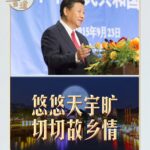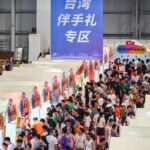Remembering the heroic deeds of martyrs, strengthening the spirit of struggle. A ceremony to present floral baskets to the people’s heroes was solemnly held on the morning of the 30th at Tiananmen Square in Beijing.
On the solemn Tiananmen Square, the bright five-star red flag flew high, and the Monument to the People’s Heroes stood majestically. In the center of the square, a giant floral basket with the message “Blessing the Motherland” expressed good wishes for the country’s prosperity. North of the monument, 18 wreaths composed of white chrysanthemums and other flowers on two floral stands conveyed the profound remembrance of all Chinese people for the heroes.
Approaching 10 o’clock, national leaders arrived at Tiananmen Square to attend the ceremony presenting floral baskets to the people’s heroes.
Trumpeters from the People’s Liberation Army Band played the deep and distant “Martyrs’ Memorial Day Fanfare.”
“Honor guards, take your positions!” Following the command, the tri-service honor guard marched with firm and powerful steps, advancing to the front of the monument where they stood at attention with their weapons.
At exactly 10 o’clock, the ceremony to present floral baskets to the people’s heroes officially began. The military band played the “March of the Volunteers,” and all present sang the national anthem of the People’s Republic of China in unison.
After the national anthem, all stood in silent tribute to the martyrs who bravely sacrificed themselves for the Chinese people’s liberation cause and the construction of the republic.
Following the moment of silence, children holding flowers faced the Monument to the People’s Heroes and sang “We Are the Successors of Communism,” giving the Young Pioneers salute.
In front of the formation, nine large floral baskets were arranged in a row, presented in the name of various national institutions and organizations. The red ribbons on the floral baskets bearing the words “Eternal Glory to the People’s Heroes” were particularly striking.
The military band played the emotional “Floral Tribute Music” as 18 honor guards steadily lifted the floral baskets and walked slowly toward the Monument to the People’s Heroes, placing them on the monument’s base.
National leaders ascended the monument base, pausing before the floral baskets to gaze intently. The bright anthuriums, blooming lilies, and fragrant orchids conveyed deep remembrance and lofty respect for the people’s heroes.
A leader stepped forward to carefully adjust the floral basket ribbons. Subsequently, the leaders walked slowly around the monument, paying their respects to the Monument to the People’s Heroes.
This year marks the 80th anniversary of the victory of the Chinese People’s War of Resistance Against Japanese Aggression and the World Anti-Fascist War. Eighty years ago, after arduous and bloody struggles, the Chinese people achieved the first complete victory against foreign invasion in modern times, opening bright prospects for the great rejuvenation of the Chinese nation.
Children and representatives from various sectors also approached the monument in turn, offering flowers and paying their respects to the monument.




